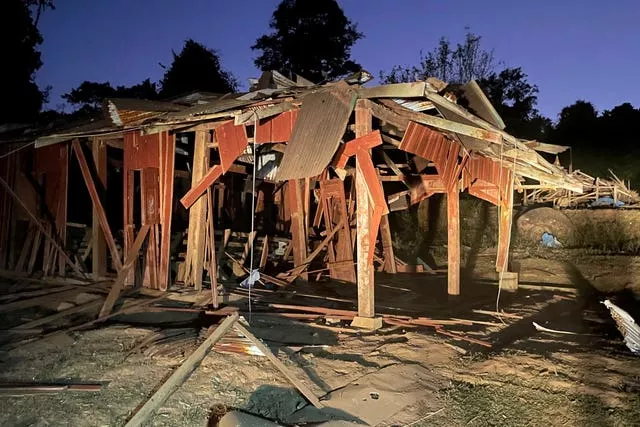Myanmar’s military is increasingly turning to air strikes with deadly results to try to crush stiff armed resistance, two years after it seized power and plunged the country into a prolonged civil war, a human rights monitoring group said on Tuesday.
The military is heavily reliant on fighter jets and helicopter gunships supplied by its allies, Russia and China, according to the non-governmental organisation Myanmar Witness and other experts.
The group’s compilation of 135 “air war incidents” from July to mid-December says the number of air strikes has been on an upward trend since September.
🔴Eyes on the Skies
🟡Report by Myanmar Witness
"As the Myanmar military struggles to exert control over areas of resistance, air strikes have become a key part of their offensive."
Full report 👇https://t.co/4cTi9gMYsy#WhatsHappeningInMyanmar #Airstrikes #Myanmar pic.twitter.com/TX0ATyUAJG— Myanmar Witness (@MyanmarWitness) January 31, 2023
Advertisement
“As the Myanmar military struggles to exert control over areas of resistance, air strikes have become a key part of their offensive,” its report says.
The military “is putting the population of Myanmar in a precarious position, destroying homes, schools and places of worship – sites which should be safe for civilians.”
According to a January statement by the National Unity Government, an underground group that calls itself the country’s legitimate government and serves as an umbrella organisation for opponents of military rule, 460 civilians, mostly children, have lost their lives in air strikes.
Myanmar’s army has defended its actions as intended to fight what it calls terrorist activities and legitimate military targets.

The army ousted the elected government of Aung San Suu Kyi on February 1 2021, and was immediately met with widespread public protests that security forces suppressed with lethal force.
The futility of non-violent protest drove opponents to armed resistance, which UN experts and others have characterised as civil war.
According to the independent Assistance Association for Political Prisoners, a watchdog group that tracks killings and arrests, 2,901 civilians have been killed by the authorities since the army takeover.
The actual death toll is likely to be much higher since the group cannot easily verify casualties in remote areas and combat zones.
The army has long contended with ethnic minority rebel groups in frontier areas fighting for greater autonomy but now finds its forces stretched thin as it also battles pre-democracy guerrillas in Myanmar’s heartland.
In many cases, ethnic rebels have teamed up with pro-democracy guerrillas in the loosely organised armed wing of the National Unity Government.
They have effectively denied the military government control of large swathes of the country, undermining its claims to legitimacy. But they lack the resources to deliver a knockout punch on the battlefield.

Although the military is demoralised and has been losing control over many parts of the country, its increasing use of air power is a major challenge for the resistance, Christina Fink, a professor of international affairs at George Washington University, said at a January 19 online seminar organised by the Stimson Centre think tank in Washington DC.
The military has an air force capability they did not have 20 years ago, she said.
“They have been able to purchase planes from both Russia and China. They’ve been able to get the training in Russia, for instance, and are now using those to great effect.”
Members of the Free Burma Rangers, a humanitarian relief organisation that offers hands-on medical assistance to ethnic minority villagers in Myanmar’s border regions, were among the rare outside witnesses who were able to see the effects of an air strike when a Myanmar jet fighter dropped two bombs on the village of Lay Wah in northern Karen state on January 12.
They observed its bombing run from a distance and rushed to the village to offer assistance.

“The bombs destroyed two churches and the school as well as other structures,” the Rangers said in an account circulated to their supporters.
The victims included a three-year-old girl and her mother, a Catholic deacon, another pastor, and a villager who was helping at the church.
David Eubank, a former member of US Army Special Forces and founder of the Free Burma Rangers, told The Associated Press in a text message last week that, since the 2021 takeover, Myanmar’s military “has come with a speed and a force we have never seen in our 30 years of humanitarian relief work here”.
“We witnessed the first air strikes right after the coup d’etat in Karen state in villages around us, killing and maiming civilians – many of the women and children we treated in our clinic,” he said.
Then, last year, he saw almost daily air strikes by Yak-130 and MiG-29 as well as K-8 jet fighters that bombed, strafed and rocketed villages and clinics.
“I saw first-hand 10 people who were killed in different bombing events and came up on other areas where many more were killed before we arrived,” he said.
“We also saw Hind attack helicopters in February. Almost every day shooting rockets, and machine gun into villages.”

The opponents of military rule have virtually no access to sophisticated weapons to combat air attacks. Their supporters are urging an embargo on the sale of aviation fuel to Myanmar to stop the air attacks.
The European Union has imposed an arms embargo on Myanmar as well as a ban on equipment that can be used for internal repression or for monitoring communications.
The US bars any commercial transactions with Myanmar’s military and its major cronies and agents.
Amnesty International Secretary-General Agnes Callamard said in November: “These air strikes have devastated families, terrorised civilians, killed and maimed victims. But if the planes can’t fuel up, they can’t fly out and wreak havoc.
“Today we are calling on suppliers, shipping agents, vessel owners and maritime insurers to withdraw from a supply chain that is benefiting the Myanmar air force.”







